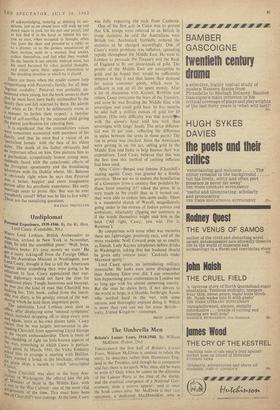Undiplomat
Personal Experience, 1939-1946. By the Rt. Hon. Lord Casey. (Constable, 30s.) WHEN Lord Lothian, British Ambassador to 'America, arrived in New York in November, 1940, he told the assembled press: 'Well, boys, 'rirain's broke. It's your money we want.' He at a nasty ticking-off from the Foreign Office. but the Australian Minister in Washington, now Lord Casey, thought it fine to tell the Americans b luntY about something they were going to be reluctant to face. Casey appreciated that war- tirne diplomacy would not have the time for traditional ploys. Tough, humorous and buoyant, il ,Was just the kind of man that Churchill was ,V,King for. This book, culled from the inevit- rte war diary, is his gossipy record of the war, during which he held three important posts. The admirable Lord Lothian soon died in after displaying some 'unusual syniptoms' which included dropping off to sleep every now alai again, 'even at his own dinner table.' Casey ms that he was largely instrumental in dis- t suading Churchill from appointing Lloyd George the vacant ambassadorship. There is more of this shedding of light on little-known aspects of t e War, something at which Casey is particu- larly good. In March, 1941, the Vichy Embassy asked him to arrange a meeting with Halifax. They wanted a break in the blockade, allowing p.)(grain ships a month to reach 'unoccupied ranee.'
. 890n Churchill was alert to the busy Aus- tralian in Washington. He offered him the job ot ,st Minister of State in the Middle East, with .7 seat in the War Cabinet: one of the most vital s_sIgnments of the time. This must have been og ne of Churchill's best castings. At the time, Casey
was fully expecting the sack from Canberra.
One of his first acts in Cairo was to protest that UK troops were referred to as British in troop statistics; he said the Australians were British too. Auchinleck hurriedly ordered the statistics to be changed accordingly. One of Casey's worst problems was inflation, spreading rapidly throughout the Middle East. He went to London to persuade the Treasury and the Bank of England to fly out plane-loads of gold. The people of the Middle East are susceptible to gold, and he hoped they would be sufficiently tempted to buy it and thus lessen their demand for scarce consumer goods, which were in- sufficient to sop up all the spare money. After a lot of discussion with Keynes, Robbins and others, Casey overcame the fears of the Treasury, and soon he was flooding the Middle East with sovereigns and small gold bars. In five months he sold half a million ounces of gold for £9 million. (The only difficulty was that sovereigns with the queen's head sold less well than sovereigns with kings' heads. The price differen- tial was 10 per cent., reflecting the difference in status between the sexes in those parts.) The rise in prices was checked. Soon the Americans ' were getting in on the act, selling gold in the Middle East and India to help finance their war expenditure. Lord Casey believes that this was the first time this method of curbing inflation had been used.
After Cairo—Bengal and famine (Churchill's casting again). Casey was greeted by a hostile province. 'How are we to endure the humiliation of a Governor from a country that prohibits In- dians from entering it?' asked the press. It is very much to his credit that, as it turned out, they were able to endure him quite easily. There is a wonderful sketch of Wavell, magnificently going under in the morass of Indian politics and ambitions; reluctantly clipping out sentences as if the words themselves might stab him in the back ('All right, Casey, you win. Fix it, Raisman').
By comparison with some other war memoirs these are,lightweight, positively racy, and all the more readable. Noel Coward pops up as readily as linnah. Lady Keynes telephones before drinks in Washington, asking that her husband should be given only tomato juice: 'Cocktails make Maynard spotty.'
Lord Casey sports an intimidating military moustache. He looks even more distinguished than Anthony Eden ever did. I can remember him hypnotising press conferences in London not so long ago with his almost unnerving suavity. But the man he shows here, if not always to the world at large, is a likeable, forthright Aussie who worked hard in the war, with some success, and thoroughly enjoyed doing it. Which is more than you can say for some British— sorry, United Kingdom—statesmen.
BRIAN GARDNER


































 Previous page
Previous page